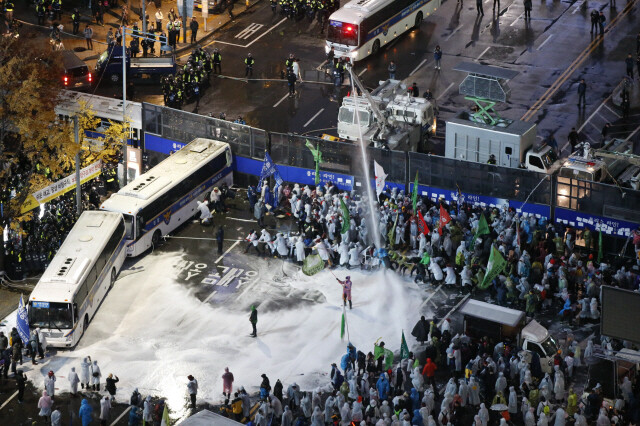hankyoreh
Links to other country sites 다른 나라 사이트 링크
South Korean police to sue groups that organized Nov. 14 popular indignation rally

South Korea’s police are preparing to sue the groups that organized the nationwide rally held on Nov. 14 of last year for close to 400 million won (US$331,000) in compensation, sources say.
The police plan to ask the courts for 320 million won (US$266,000) in compensation for police vehicles and equipment that were damaged during the first nationwide rally last year and 40 million won (US$33,000) in treatment for police (both regulars and conscripts) who were injured during violent clashes with protestors, the Hankyoreh learned through interviews with various sources in the Korean National Police Agency and Seoul Metropolitan Police Agency on Jan. 31.
After finalizing its tally of damages from the demonstration, the police intend to file their lawsuit with the courts sometime in the middle of February, after deliberations with South Korea’s Ministry of Justice and the prosecutors.
The primary work of the lawsuit will be handled by Security Team No. 3 at the Seoul police agency, which is composed of officers with attorney licenses. The team will be assisted by a taskforce from the national police force in charge of reforming regulations and legal matters. Security Team No. 3 will also be filing lawsuits on behalf of various police officers who were injured during the demonstration.
Since any damages that the courts may award these police officers will be paid to them individually, this effectively means that the South Korean state is paying the legal fees for individual police officers.
The Seoul police agency maintains that this is not a problem, since the lawsuits will be filed with the consent of the police officers in question and since money is not the object of these lawsuits.
But the police are facing criticism for being a public organization that is exploiting its members - individual police officers - to pursue retaliatory lawsuits against private citizens.
Criticism of Security Team No. 3 of the Seoul police agency, which has been charged with the lawsuit, has been particularly fierce. The team was launched in Nov. 2014 with the purpose of providing “continuous legal assistance to ensure that human rights are protected and that the law is enforced with confidence during the process of managing demonstrations and protests.”
But since it was set up, the team has done more to file civil lawsuits against those participating in demonstrations than to keep those demonstrations safe and peaceful. For example, the team sued a group called People’s Solidarity for the Promise of April 16 and its leaders after the group organized demonstrations about the Sewol tragedy on Apr. 18 and May 1 of last year.
“It is a serious abuse of public power for the police to file a series of civil lawsuits against participants in demonstrations, and this restricts the constitutionally guaranteed freedoms of assembly and expression by threatening people with the law and lawsuits,” said Seo Bo-hak, a law professor at Kyung Hee University.
“When government agencies that are supported by public taxes use those taxes and their authority to trample on the basic rights of the public, they are both violating the principle of popular sovereignty and engaging in a practice for which few precedents can be found among developed economies.”
By Park Tae-woo and Bang Jun-ho, staff reporters
Please direct questions or comments to [english@hani.co.kr]

Editorial・opinion
![[Column] Season 2 of special prosecutor probe may be coming to Korea soon [Column] Season 2 of special prosecutor probe may be coming to Korea soon](https://flexible.img.hani.co.kr/flexible/normal/500/300/imgdb/original/2024/0426/3317141030699447.jpg) [Column] Season 2 of special prosecutor probe may be coming to Korea soon
[Column] Season 2 of special prosecutor probe may be coming to Korea soon![[Column] Park Geun-hye déjà vu in Yoon Suk-yeol [Column] Park Geun-hye déjà vu in Yoon Suk-yeol](https://flexible.img.hani.co.kr/flexible/normal/500/300/imgdb/original/2024/0424/651713945113788.jpg) [Column] Park Geun-hye déjà vu in Yoon Suk-yeol
[Column] Park Geun-hye déjà vu in Yoon Suk-yeol- [Editorial] New weight of N. Korea’s nuclear threats makes dialogue all the more urgent
- [Guest essay] The real reason Korea’s new right wants to dub Rhee a founding father
- [Column] ‘Choson’: Is it time we start referring to N. Korea in its own terms?
- [Editorial] Japan’s rewriting of history with Korea has gone too far
- [Column] The president’s questionable capacity for dialogue
- [Column] Are chaebol firms just pizza pies for families to divvy up as they please?
- [Column] Has Korea, too, crossed the Rubicon on China?
- [Correspondent’s column] In Japan’s alliance with US, echoes of its past alliances with UK
Most viewed articles
- 1[Column] Season 2 of special prosecutor probe may be coming to Korea soon
- 2‘We must say no’: Seoul defense chief on Korean, USFK involvement in hypothetical Taiwan crisis
- 3N. Korean delegation’s trip to Iran shows how Pyongyang is leveraging ties with Moscow
- 4Amnesty notes ‘erosion’ of freedom of expression in Korea in annual human rights report
- 5[Editorial] Korea’s surprise Q1 growth requires objective assessment, not blind fanfare
- 6Division commander ordered troops to enter raging flood waters before Marine died, survivor says
- 7[Reportage] On US campuses, student risk arrest as they call for divestment from Israel
- 8Korea sees more deaths than births for 52nd consecutive month in February
- 9Is N. Korea threatening to test nukes in response to possible new US-led sanctions body?
- 10Is Japan about to snatch control of Line messenger from Korea’s Naver?